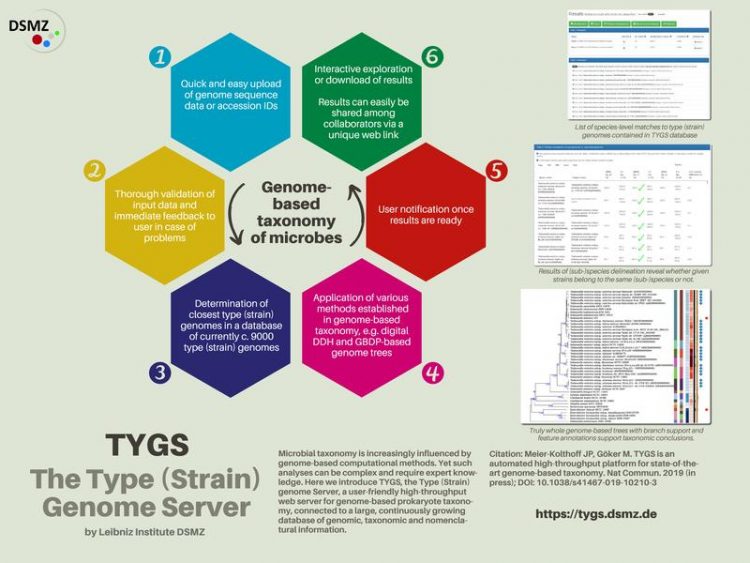New bioinformatics platform for the genome-based taxonomical classification of bacteria and archaea

Infographic Type (Strain) Genome Server DSMZ
“TYGS is an automated high-throughput platform for state-of-the-art genome-based taxonomy”, is the title of the paper published in the current issue of the internationally renowned journal Nature Communications.
In this paper, Dr. Jan P. Meier-Kolthoff and Ass. Prof. Dr. Markus Göker, both of the Department for Bioinformatics at the Leibniz Institute DSMZ-German Collection of Microorganisms and Cell Cultures, share their findings regarding the new Type Strain Genome Server TYGS.
Scientists at the DSMZ developed this Type (Strain) Genome Server (TYGS: https://tygs.dsmz.de) as a bioinformatics platform for the genome-based taxonomy of bacteria and archaea. The server is based on a database with weekly updates, which links comprehensive information on taxonomy and nomenclature to almost 9,000 microbial type strain genome sequences and essentially all type strain 16S sequences.
The Type (Strain) Genome Server uses a high-throughput process to automatically determine the type strain genome sequences most closely related to one (or up to several) user-defined genome sequences, and from there calculates, amongst others, a true genome-based family tree, a categorization of species and subspecies using digital DNA:DNA hybridization, and all differences in genomic GC-Content.
For this, the TYGS uses a number of scientifically established and frequently cited methods including the Genome-to-Genome Distance Calculator (GGDC) or a phylogenomic process called Genome BLAST Distance Phylogeny (GBDP).
The user receives a specific link to an interactive website of the TYGS-server containing all relevant information in form of tables, modifiable figures ready for publication, references on taxonomy literature as well as complete texts on methods and results.
The data can be integrated directly into microbiological studies and papers; in addition, the user is also able to exchange them with cooperation partners via the web link provided.
Should the phylogenetic environment be thought to not yet contain genome-sequenced type strains, the user may conveniently use TYGS on the basis of this result to request a more comprehensive tree analysis of the 16S rRNA gene sequences.
Press contact:
Sven-David Müller, Head of Public Relations, Leibniz Institute DSMZ-German Collection of Microorganisms and Cell Cultures GmbH
Phone: ++49 (0)531/2616-300
Mail: sven.david.mueller@dsmz.de
About the Leibniz Institute DSMZ
The Leibniz Institute DSMZ-German Collection of Microorganisms and Cell Cultures is the world's most diverse collection of biological resources (bacteria, archaea, protists, yeasts, fun-gi, bacteriophages, plant viruses, genomic bacterial DNA as well as human and animal cell lines). Microorganisms and cell cultures are collected, investigated and archived at the DSMZ. As an institution of the Leibniz Association, the DSMZ with its extensive scientific services and biological resources has been a global partner for research, science and industry since 1969. The DSMZ is the first registered collection in Europe (Regulation (EU) No. 511/2014) and certified according to the quality standard ISO 9001:2015. As a patent depository, it offers the only possibility in Germany to deposit biological material in accordance with the requirements of the Budapest Treaty. In addition to scientific services, research is the second pillar of the DSMZ. The institute, located on the Science Campus Braunschweig-Süd, accommodates more than 69,701 cultures and biomaterials and has 198 employees. www.dsmz.de
The Leibniz Association
The Leibniz Association connects 95 independent research institutions that range in focus from the natural, engineering and environmental sciences via economics, spatial and social sciences to the humanities. Leibniz Institutes address issues of social, economic and ecological relevance. They conduct knowledge-driven and applied basic research, maintain scientific infrastructure and provide research-based services. The Leibniz Association identifies focus areas for knowledge transfer to policy-makers, academia, business and the public. Leibniz institutions collaborate intensively with universities – in the form of “Leibniz ScienceCampi” (thematic partnerships between university and non-university research institutes), for example – as well as with industry and other partners at home and abroad. They are subject to an independent evaluation procedure that is unparalleled in its transparency. Due to the importance of the institutions for the country as a whole, they are funded jointly by the Federation and the Länder, employing some 19,100 individuals, including 9,900 researchers. The entire budget of all the institutes is approximately 1.9 billion Euros. www.leibniz-gemeinschaft.de
Meier-Kolthoff JP, Göker M. TYGS is an automated high-throughput platform for state-of-the-art genome-based taxonomy. Nat Commun. 2019;10: 2182. doi:10.1038/s41467-019-10210-3
Media Contact
All latest news from the category: Life Sciences and Chemistry
Articles and reports from the Life Sciences and chemistry area deal with applied and basic research into modern biology, chemistry and human medicine.
Valuable information can be found on a range of life sciences fields including bacteriology, biochemistry, bionics, bioinformatics, biophysics, biotechnology, genetics, geobotany, human biology, marine biology, microbiology, molecular biology, cellular biology, zoology, bioinorganic chemistry, microchemistry and environmental chemistry.
Newest articles

First-of-its-kind study uses remote sensing to monitor plastic debris in rivers and lakes
Remote sensing creates a cost-effective solution to monitoring plastic pollution. A first-of-its-kind study from researchers at the University of Minnesota Twin Cities shows how remote sensing can help monitor and…

Laser-based artificial neuron mimics nerve cell functions at lightning speed
With a processing speed a billion times faster than nature, chip-based laser neuron could help advance AI tasks such as pattern recognition and sequence prediction. Researchers have developed a laser-based…

Optimising the processing of plastic waste
Just one look in the yellow bin reveals a colourful jumble of different types of plastic. However, the purer and more uniform plastic waste is, the easier it is to…



